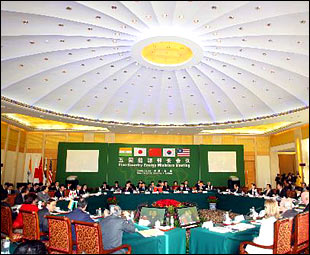| Home / Environment / International Cooperation | Tools: Save | Print | E-mail | Most Read |
| Big Energy Users to Cooperate |
| Adjust font size: |
China, hosting its first major energy summit at the weekend, urged top oil consumers to unite in the face of fluctuating global oil prices and maintain energy security.
China, the United States, Japan, South Korea and India, which together use nearly half of the world's energy, agreed in a joint statement to strengthen cooperation in seeking energy alternatives and conservation and the sharing of information. The five nations will also focus on diversifying energy sources, increase efficiency to reduce oil dependency, cooperate on strategic oil reserves and encourage more investment in the industry to ensure sufficient supply. "We are trying to convey a rational and active signal to the world that its major oil consumers will strengthen cooperation in energy savings, increase efficiency and seek oil alternatives," said Ma Kai, Minister of the National Development and Reform Commission (NDRC). Proposed by China the first-ever meeting of energy ministers from the world's leading oil consuming nations comes at a time of fluctuating prices and growing demand. Last year the five countries consumed 45.2 percent of the world's oil production, Ma said. He said the five had shared interests and were confronted by common problems. The energy chiefs also called on all countries to build energy markets that are open, transparent, efficient and competitive. Already the world's second-largest oil consumer and second-largest oil importer China's demand is forecast to more than double by 2025. Ma said the country would stick to its energy policy with coal at the core and attempt to diversify its structure with oil, gas and new resources. Coal still accounted for 70 percent of China's energy consumption and Ma said the country plans to enhance its renewable resources from 7 percent to 16 percent by 2020. Chen Shouhai, professor from the China University of Petroleum, said the summit reflected "an inevitable trend of cooperation between oil consumers." "Rather than seeking an alliance to confront the world's major oil producers the summit focused on cooperation in conservation, technology, and development of new resources to reduce their reliance on oil," Chen said. The five countries hoped the dialogue would become a regular event and Japan has already offered to host the next round, Indian Minister of Petroleum and Natural Gas Murli Deora, told Reuters. Nuclear deal On Saturday China and the United States signed an agreement that paves the way for US-based Westinghouse Electric Co to build four civilian nuclear reactors in China. This is a multi-billion dollar deal that edged out French and Russian competitors in a two-year battle. A memorandum of understanding on the transfer of nuclear technology to China was signed by Ma and US Energy Secretary, Samuel Bodman. The agreement capped several days of top-level talks between the two countries. Both sides hailed the deal as a major step towards enhancing relations between the world's two biggest energy consumers who've clashed over a range of issues from the RMB exchange rate to a Chinese bid for American oil firm Unocal last year. "This project of cooperation will certainly play a very important role in enhancing the cooperative partnership between China and the US," Ma said. Stephen Tritch, Westinghouse's president, said the details of the contract to build facilities at Sanmen, in east China's Zhejiang Province and at Yangjiang in south China's Guangdong Province have yet to be finalized. He said the company wants the plants to be operational by 2013. NDRC confirmed on its website that it chose Westinghouse's AP1000 technology after "careful appraisal." Both Russian and French competitors had lobbied hard for the deal. Sources said the country chose Westinghouse based on its technology, its agreement on transferring expertise, the style of cooperation and the prospects for developing locally-based technology. AP1000, a third generation nuclear technology, relies on gravity rather than mechanical pumps to carry water to a reactor in an emergency. Westinghouse, US engineering and construction services contractor Shaw Group Inc, which holds a 20 percent stake in Westinghouse and China's State Nuclear Power Technology Co also signed a "companion agreement" to follow through with negotiations on specific terms for the technology transfer. The deal with China will create more than 5,000 jobs in the United States, Bodman said, helping to redress the mammoth US trade deficit with China. (China Daily December 18, 2006) |
| Tools: Save | Print | E-mail | Most Read |
 |
| Related Stories |
